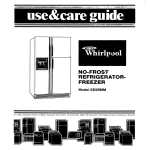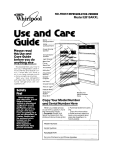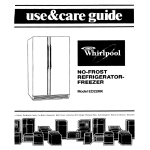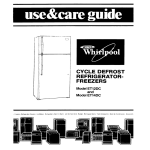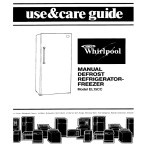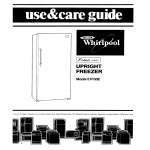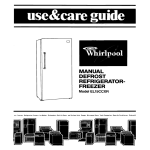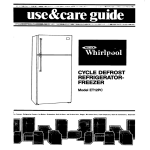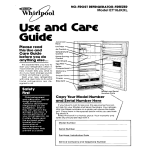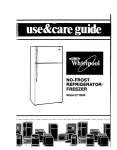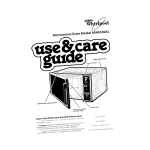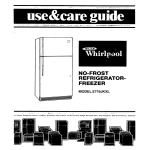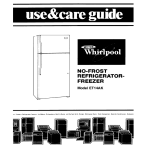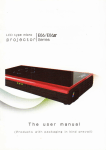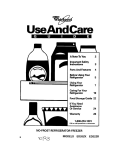Download Whirlpool EL11PC User's Manual
Transcript
cl MANUAL DEFROST REFRIGERATORFREEZER Model EL11PC ,1. Freezers. Refrigerator-Freezers. Ice Makers, Dishwashers, Built-In Ovens. and Surface Units, Ranges, Microwave Ovens, Trash Compactors. Room Air Conditioners. Oehumrdrlir Please read this Use and Care Guide before you do anything else... This booklet tells you how to start your refrigerator, clean it, move shelves and adjust controls. It even tells you what new sounds to expect from your refrigerator. Treat your new refrigerator with care. Use it only to do what home refrigerators are designed to do. Parts and features \ Freezer Compartment Stationary Extra Cold Shelves - Ice Cube Model and Serial Number Plate Crisper - I I I I Crisper Levelling w Leg \ Copy your Model and Serial Numbers here... When you need service cx call with a question, have this information ready: Model Number 1. Complete Model and Serial Numbers (from the plate located as shown). Serial Number 2. Purchase date from sales slip Purchase Date I Copy this information in these spaces. Keep this book, your warranty and sales slip together in a handy place. Service Company and Telephone Number Contents Page BEFOREYOUPLUGITIN ................ 3 Install Properly. ...................... Level Refrigerator. .................... Remove Sales Labels ................ Cleanlt ............................ Plugltln ............................ TurnItOn ........................... 4 USING YOUR REFRIGERATOR, .......... Setting the Control ................... The Freezer Tray ..................... Changing the Light Bulb .............. Adjusting the Refrigerator Shelves ..... Removing Crisper and Crisper Cover .. Ice Cube Trays ...................... 4 4 DEFROSTING AND CLEANING YOUR REFRIGERATOR ....................... 4 4 4 Defrosting the Freezer Compartment. Cleaning the Refrigerator. ............ Cleaning Chart ..................... 5 5 5 Page 6 7 Sounds You May Hear ................ Energy Saving Tips ................... FOOD STORAGEGUIDE ................ VACATION AND MOVING CARE. ....... IF YOU NEED SERVICE OR ASSISTANCE 6 6 6 6 I. 2. 3. 4. Before You Call for Assistance ....... If You Need Assistance ............. IfYouNeedService ................ IfYouHaveaProblem.. ............ 7 .. 7 8 8 9 10 11 11 11 11 11 01985 Whirlpool Corporation Before you plug it in IMPORTANT Before using your refrigerator, you are personally responsible for making sure that it... l is installed and leveled on a floor that will hold the weight, and in an area suitable for its size and use. l is connected only to the right kind of outlet, with the right electric supply and grounding. [See page 4.) l is used only for jobs expected of home refrigerators. l is not near an oven, radiator or other heat source. l is properly maintained. l is out of the weather l l l l is used in an area where the room temperature will not fall below 55°F (13°C). or rise above 110°F (43.3”(z). is not run where there are explosive fumes. is not used by children or others who may not understand how it should be used without proper instruction. is not loaded with food before it has time to get properly cold. Install properly.. . Remove sales labels.. . Remove the Consumer Buy Guide label, tape and any inside labels before using the refrigerator. To remove any remaining glue: 1. Rub briskly with thumb to make a ball then remove. OR 2. Soak area with dishwashing detergent solution (1 teaspoon detergent in 1 quart warm water] before removing glue as described in step 1. DO NOT USE rubbing alcohol or flammable or toxic solvents, such as acetone, gasoline, carbon tetmchlorlde, etc. These can damage the material. NOTE: DO NOT REMOVE ANY PERMANENT INSTRUCTION LABELS INSIDE YOUR REFRIGERATOR. Do not remove the Tech Sheet fastened under the refrigemtor at the front. Clean it.. . Clean your refrigerator before plugging it. See cleaning instructions on page 7 I, Allow 3 inches [ 7.5 cm] between overhead cabinets and the refrigerator top. 2. Allow at least an inch (2.5cm) between the refrigerator condenser and the wall. 3. Allow % inch (1.25 cm) on each side of the refrigerator for ease of installation. 4. If the refrigerator is to be against a wall, you might want to leave enough space so the door can be opened wider. it in or usrng Plug it in... Level refrigerator... L!efrlgerotor Powercota RECOMMENDED GROUNDING METHOD A 115 Volt, 60 Hz., AC only 15 or 20 ampere fused and properly grounded electrical supply is required. It is recommended that a separate circuit serving only this appliance be provided. Levelli Do not use an extension cord. Use a receptacle which cannot be turned off with a switch or pull chain. See individual electrical requirements and grounding ature package. 1. Keep the 4 bolts that held refrigerator in shipping crate. They a:e the levelling legs. 2. Screw these bolts all the way into bolt holes at the bottom corners of refrigerator 3. Adjust each leg until the refrigerator won’t rock. Slide refrigerator into place. 4. Adjust front legs to level the refrigerator, -To raise corners, turn legs clockwise. -To lower corners, turn legs counterclockwise. 5. Check with level. sheet in your liter- Turn it on... l 4 instruction Move run switch to RUN NOTE: The refrigerator motor will not operate untll the run switch is on RUN. Using your refrigerator Temperature Control Ltght Swttch Run Swttch . ., Setting the control . . . ” The control for the refrigerator temperature IS rn the refrigerator When the refrigerator IS plugged tn and the run swrtch is moved to RUN Give the refrigerator pletely betore addlng time to cool down comfood. (This may take sev- era1 hours.) This setting should be about right for normal household refrigerator usage. The control will be set about right when milk or juice is as cold as you like. In hot weather or if the door is opened often, turn the control to a higher number to keep the temperature you like. If the milk or juice is too cold or refrigerator items start to freeze, turn the control to a lower number or adjust the freezer tray damper. Wait 24 hours after an adjustment is made before further change is made to the controls. l Set the THERMOSTAT CONTROL to 3 The freezer tray.. The freezer tray is located under the freezer compartment. The damper at the rear of the freezer tray helps control the refrigerator temperature for warm weather operation. The damper can be adjusted for proper cooling and defrosting of the refrigerator, - lo adjust the damper: I, Pull out the freezer tray. 2. Lift out the damper from the rear of the tray. 3. Slide damper into the desired position. “A” position for normal cooling and defrosting. E - (FULL Open] NOTE: “B, C, D” posltlons provlde tlne tooling adlustments to best meet your cooling needs In warm weather. E” position for warm wedther settlng. Changing the light bulb.. . Unplug lhe refrigerator the llghl bulb. before changing I, Reach behind control console to find bulb. 2. Remove bulb. 3. Replace with a 40.watt [maximum] appliance bulb. Adjusting the refrigerator shelves... 1 First, remove fo& from shelf. 2. Slide shelf straight out to stop. 3. Lift front. 4 Shde the rest of the way out Replacing Shelf Stop a/m Shelf: 1 Fit back of shelf on top of guides with wire stops on the bottom of guides 2 Ltft front, slide shelf In until It clears guide stops Removing crisper and crisper cover.. . Lift the Front. Then the Back. !w ‘Shelf Guide Removing Crisper: l Slide crisper straight out. Remove Cover: I. Lift back, then slide to the rear until the front can be Med. 2. Lif-tcover up and out. Replacing Cover: I, Slide the front cover tabs into the back of the front supports on the refrigerator wall. 2. Lower back into place. Ice cube trays... To remove If cubes are not used, they may shrink The moving cold air starts a slow evaporation. The longer cubes are stored, the smaller they get. ice: 1. Hold tray at both ends. 2 Slightly twist. Souncls you may hear.. . Your new refrlgerotor may make sounds that your old one dldn t Because the sounds ore new to you. you might be concerned about them Don t be Most of Ihe new sounds are normal Hard surfaces llke the floor. walls and coblnets can make the sounds seem louder The followlng chart describes the kinds of sounds that might be new to you and what may be maklng them Poutbte l Water l Running 6 Sounds: Sounds: Sounds: Probable Causes: When the refrigerator stops running. you may hear gurgling few minutes after tf stops In the tubing for a Your refrigerator has a high-efflclency compressor and motor If WIII run longer than older designs It may even seem to run most of the time Energy saving tips.. . You can help your refrigerator use less electncity. Check door gaskets for a tight seal. Level the cabinet to be sure of a good seal. l Clean the condenser coil regularly. l Open the door as few times as possible. Think about what you need before You open the doot. Get even/thing out at one time. Keep foods organized so you won’t have to search for what you want. Close door as soon as food is removed l Go ahead and fill up the refrigerator, but don’t overcrowd it so air movement is blocked. l l l lt is a waste of electricity to set the refrigerator and freezer temperatures colder than they need to be. If ice cream is firm in the freezer and drinks are as cold as your family likes them, that’s cold enough. Make sure your refrigerator is not next to a heat source such as a range, water heater, furnace. radiator, or in direct sunlight. Defrosting and cleaning your refrigerator The freezer compartment in your refrigerator should be defrosted whenever frost builds up to h-inch (6 mm]. The entire refrigerator should be cleaned about once a month to help prevent odors from building up. Of course. spills should be wiped up right away. Defrosting the freezer compartment.. . 1. Move the Run Switch to “OFF:’ 2. Remove food and ice cube trays. Wrap food in newspaper and put in a cooler to keep frozen. 3. Make sure the freezer tray damper is in the “A” position. 4. Place a pan of hot water in the freezer compartment to speed defrosting. Leave door open. 5. CAUTION: Do not use any type of electric defroster or sharp utensils (ice pick, knife, etc.) to speed defrosting. These can cause damage. Scrape with plastic window scraper. 6. Replace hot water every 10 to 15 minutes. 7. Soak up defrost water with a cloth or sponge. “A” position for normal cooling and defrosting. 8. Empty defrost water from freezer tray (Pull out to stops; lift front slightly; pull out the rest of the way.) 9. Clean compartment and freezer tray with a solution of two tablespoons (26 g] of baking soda and one quart (.95 I) of warm water Rinse well and dry IO. Replace food and ice cube trays. 11. Move the Run Switch to RUN. Cleaning the refrigerator... To clean your refrigerator, move the Run Switch to OFF, unplug it, take out all removable parts, and clean it according to the following directions. When cleaning is complete, replace all refrigerator parts, plug it in, and move the Run Switch to RUN. Cleaning chart.. . I Part ,, Removable parts [shelves, crisper, etc.1 Outside 1. what to us. How to cioan Sponge or cloth; mild detergent and warm water Sponge, cloth or paper towel; mild detergent: appliance wax [or good auto paste wax) Wash removable parts wrth warm water and a mild detergent Rinse and dry l l Wash with warm water and a mild detergent. Do not use abmsive or harsh l cleansers. Rinse and dry Wax painted metal surfaces at least twice a year with appliance wax or a good auto paste wax. Apply wax with a clean, soft cloth. Do not use wax l l on plasttc parts. Waxing painted Inside walls (freezer compartment should be allowed to warm up so cloth won’t stick.) metal surfaces provides Sponge, soft cloth or paper towel. bakrng soda, warm water. mild detergent Wash wrth warm water and - mrld detergent or - baking soda [ 2 tablespoons 1 quart ( 95 I) warm water Rinse and dry l l Door liners and gaskets Sponge, soft cloth or paper towel, mrld detergent, warm water rust protection. l l Wash with mrld detergent water Rinse and dry I 26 g I to and warm DO NOT USE Cleaning waxes, concentmted detergents, bleaches or cleansers containing petroleum on piastlc parts. Dark Plastics (covers and panels) l l Wash with a soft grit-free cloth or sponge Rinse and dry with a damp grit-free cloth or chamors DO NOT USE paper towels, window spmys, scouring cleansers, or flammable or toxic solvents like acetone, gasoline, carbon tetmchiorlde, etc. These can scmtch or damage the material. ,,. Condenser Mrld detergent and warm water. soft, clean sponge and soft, clean cloth coils ” Use vacuum cleaner with brush attachment l Clean dust and lint from condenser coils behind the refrigerator at least every other month. Be care- ful, the flns on the coils are sharp. Floor under refrigerator Usual floor cleaners l l l l Slide refrigerator out away from wall Wash floor Slide refrigerator back into place Check to see if the refrigerator is level, Food storage guide Leafy vegetables (lettuce, celery and parsley) Before storrng, remove the store wrap and trim off brutsed areas Wash in cool water and drain slrghtly Water should be clrngrng to the greens as they go into the crisper This water provides the atmosphere of high humtdrty necessary for keeprng the leafy vegetables fresh and crisp durtng storage Vegetables with skins (tomatoes Wash, dry and store in a crisper and peppers] Fruits Wash, dry and store In a crisper with vegetables such as tomatoes Berries keep better of not washed or hulled until ready to use Sort, then state berries In a loosely closed paper bag and store on refrigerator shelf Meat* Meat ISperishable and proper care IS essential to maintaining Its keeping qualrttes. Store fresh meat on the Interior refrigerator shelves Refer to the chart on this page for recommended refrigerator food storage trmes Fresh meat, prepackaged .-Store In refrigerator the chart, following, storage times. Cold cuts .Store them in their original wrapping until you are ready to use. Once the package is opened. tightly rewrap unused cold cuts in plastic wrap or oluminum foil. STORAGE CHARTFORFRESHANDCUREDMEAT’ Approximate Time nwe Vwsl Variety Meats . . . . . . . . . . . . . , . . . . . . 1 to 2 Chicken . . . . . . . . . . . . . . . . . . . . . . . . . . 1 to 2 Ground Beef . . . . . . . . . . . . . . . . . . . 1 to 2 Steaks and Roasts . . . . . . . . . . . . . . . . 3 to 5 Cured Meats . . . . . . . . . . . . . . . . . . 7 to 10 Bacon . . . . . . . . . . . . . . . . . . . . . . . . . . . . 5to7 ColdCuts . . . . . . . . . . . . . . . . . . . . . . . . 3to5 ‘If meat is stored a day or two longer than the above recommended time, wrap in air tight packaging and store in freezer compartment. by the meat retailer In theortginal wrapplng Referto for recommended refrigerator Fresh meat, not prepackaged.. NOTE: Fresh fish and shellfish should be used the same day purchased Eggs Store wlthout washrng in the orIgInal carton or use the egg nest In the door Prepackaged Milk Wipe milk cartons For best storage. place milk on top interior shelf. Beverages Wipe bottles and cans Store on lower door shelves beneath the egg nest or interior shelves Remove from the market wrapping paper, wrap in aluminum foil. Refer to chart on this page for recommended storage times. frozen meat Place In the freezer compartment or freezer tray immediately after purchase unless it is to be defrosted for cookrng. Cooked meats (leftovers) Cool within one to two hours after cooklng, then cover or wrap tightly with plastic wrap or aluminum foil to prevent drying, and store in the refrigerator Bones may be removed to conserve storage space, but meat should be left in as large a piece as possible Meats cooked in lrquid for future serving should be cooled uncovered. within one to two hours, then covered and stored In the refrigerator To speed coolrng, when meat is cooled in liquid, the pan containing the cooked meat may be set where there is good circulation of cool air, or it may be cooled by setting the pan In cold or running water Cured and smoked meats wrapping After opening, wrap or aluminum foil Cooked meat. .Wrap or cover tightly with plastic wrap or aluminum *Courtesy Keep best In orrginal rewrap tightly in plastic foil of Not’1 Live Stock ond Meat Board Butter. Store dally needs on serving dish in butter compartment. When storing an extra supply. wrap in arrrtight packaging and store In freezer companmentor on top door shelves. Cheese Store In original wrapping until you ore ready to use Once the package is opened. rewrap tightly In plastic wrap or alumtnum foil Store on interior refrigerator shelves. Condiments .Store catsup, mustard. telly. oltves. pickles, etc on door shelves NOTE: Store bottled and canned items on door shelves beneath the egg nest. Leftovers...Always cover the container with plastic wrap or aluminum foil to keep food from drying. Store on refrigerator shelves. ice cream., .Store on the bottom of the freezer compartment. Once package is opened, place a piece of aluminum foil snugly against the surface of the ice cream. This will prevent ice crystals from forming. Frozen soups, juices.. .Store in freezer compartment. Packaged frozen food. .Store in freezer compartment or in the full-width freezer tray. Frozen meats .Wrap In freezer packaging and store in freezer compartment ice trays compartment .Place on the bottom material or freezer tray, of the freezer Vacation Short vacations... Moving... No need to shut off the refrigerator if you will be away for less than four weeks Use up perishables. Remove all food. Pack frozen foods in dry ice. Unplug the refrigerator and clean it thoroughly. Remove everything that comes out. Wrap all parts well and tape them together so they don’t shift and rattle Screw in the levelling legs; tape the door shut; tape the electric cord to the cabinet. When you get to your new home, put everything back and refer to page 4. Long vacations... Remove all food if you are going for a month or more Turn the Temperature Control to OFF, unplug the refrigerator and clean ittrinse welt and dry Tape rubber or wood blocks to the door.. keeping it open far enough for air to get in. This will keep odor and mold from building up. Tape the blocks out ot a child’s reach...do not allow children near the refrigerator when the door is blocked open. To restart refrigerator, 10 see instructions on page 4. QUESTIONS? ...caII your COOL-LINE 9 service assistance telephone number (page 11). If you need service or assistance, we suggest you follow these four steps: 1. Before calling for assistance.. . 3. If you need service*... Performance problems often result from little things you can find and fix yourself without tools of any kind. Whirlpool has a nationwide network of franchised TECH-CARE n Service Companies. TECH-CARE service technicians are trained to fulfill the product warranty and provide after-warranty service, anywhere in the United States. To locate TECH-CARE service in your area. call our COOL-LINE service assistance telephone number (see Step 2) or look in your telephone directory Yellow Pages under: It your refrigerator l l l will not operate: Is the electric cord plugged in? Is a fuse blown OTa circuit breaker Is the Run Swatch on RUN3 If there Is a ratillng untamlllar sounds: l or jlngllng tripped? nolse, or other Is something on top or behind the refrigerator ing noise when the refrigerator is running? mak- If the light doesn’t work: l Check fuses and circuit plugged in. breakers. Make sure it’s If a bulb Is burned out: l See instructions for changing light bulbs on page 5. Use appliance bulbs only. If the motor seems to l l l l N~I too much: Is the condenser, behind the refrigerator, free from dust and lint? On hot days, or if the room is warm, the motor naturally runs longer. If the door has been opened a lot, or if a large amount of food has been put in, the motor will run longer to cool down the interior. Is frost build-up more than % inch (6 mm)? Remember: Motor running time depends on different things. number of door openings, amount of food stored, temperature of the room, settrng of the control and damper posrtion 2. If you need assistance*. . . Call Whlrlpool COOL-LINE@ service asslstance telephone number. Dial free trom: Contlnental U.S. . . . . . . . . . . . . (800) 253-1301 Mlchlgan . . . . . . . . . . . . . . . . . . . (800) 632-2243 Alaska & Hawall . . . . . . . . . . . (800) 253-1121 and talk with one of our trained Consultants, The Consultant can instruct you in how to obtain satlsfacton/ operation from your appliance or, if service is necessary. recommend a qualified service company in your area. 0 FSP 8 FSPIS o registered trademark of Whlrtpool CorIYXotlon for quollty ports Look for H-IS symbol of quollty whenever you need o replacement poti for your Whirlpool appliance FSP replacement ports will fit rrght and work right. because they ore mode to the some exoctlng specifications used to build every new WhIrlpool opplronce APPLIANCES-HOUSEHOLDMAJOR-SERVICE h REPAIR WHIRLPOOLAPPLIANCES FRANCHISEDTECH~CARESERVICE SERVICE XVZSERVICECO 123 Maple ELECTRICAL APPLIANCESMAJORREPAIRING 6 PARTS OR WHIRLPOOLAPPLIANCES FRANCHISEDTECH-CARESERVICE COMPANIES SERVICE XVZSERVICECO 123 Maple. 999.9999 COMPANIES 999.9999 OR WASHING MACHINES. DRVERS 6 IRONERS-SERVICING WHIRLPOOLAPPLIANCES FRANCHISEDTECH-CARESERVICE SERVICE XYZSERVICECO 123 Maple . . . . C0MPA.VIE.S . . . 999.9999 4. If you have a problem * . . . Call our COOL-LINE service assistance telephone number (see Step 2) and talk with one of our Consultants, or if you prefer, write to: Mr. Stephen E. Upton Senior Vice President Whirlpool Corporation Administrative Center 2000 US-33 North Benton Harbor, Ml 49022 *If you must call or write, please provide: model number. serial number, date of purchase, and a complete description of the problem, This information is needed in order to better respond to your request for assistance. Making your world a little easier. Part No. 1103807 01985 Whirlpool Corporation Printed in U.S.A. Makers. Dishwashers. Built-In Ovens, and Surlace Units, Ranges, Microwave Ovens, Trash Compactors, Room Air Conditioners, Dehumidifiers, Automatic Washers, Clothes Dryer5












